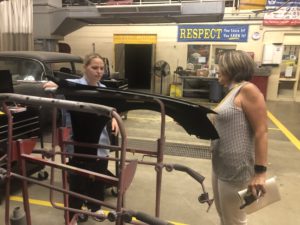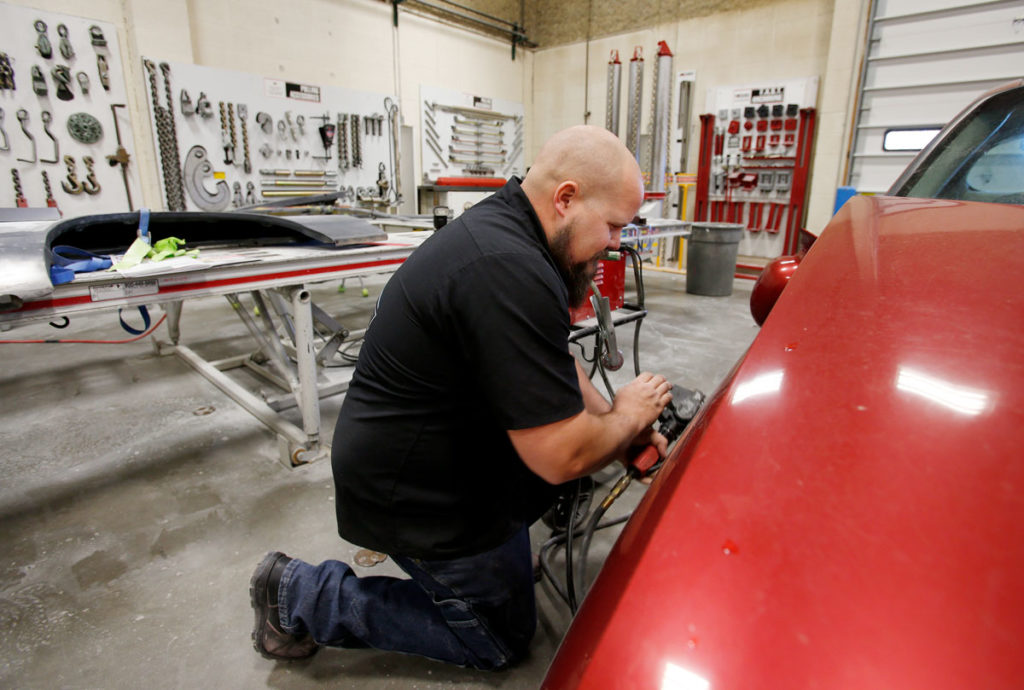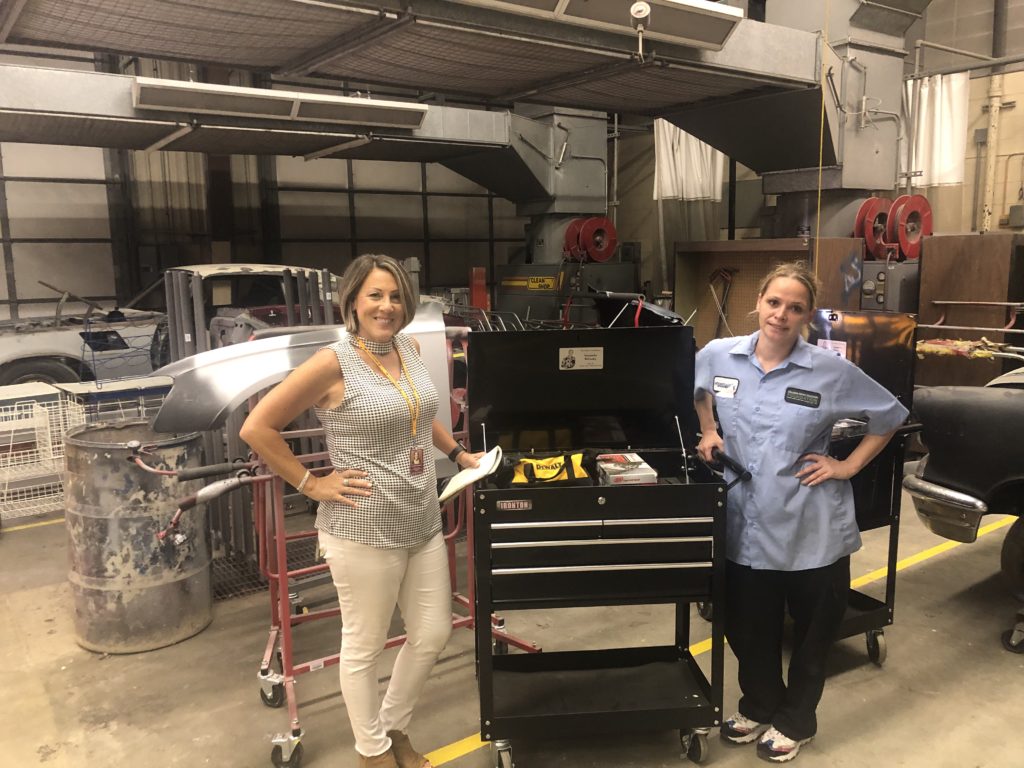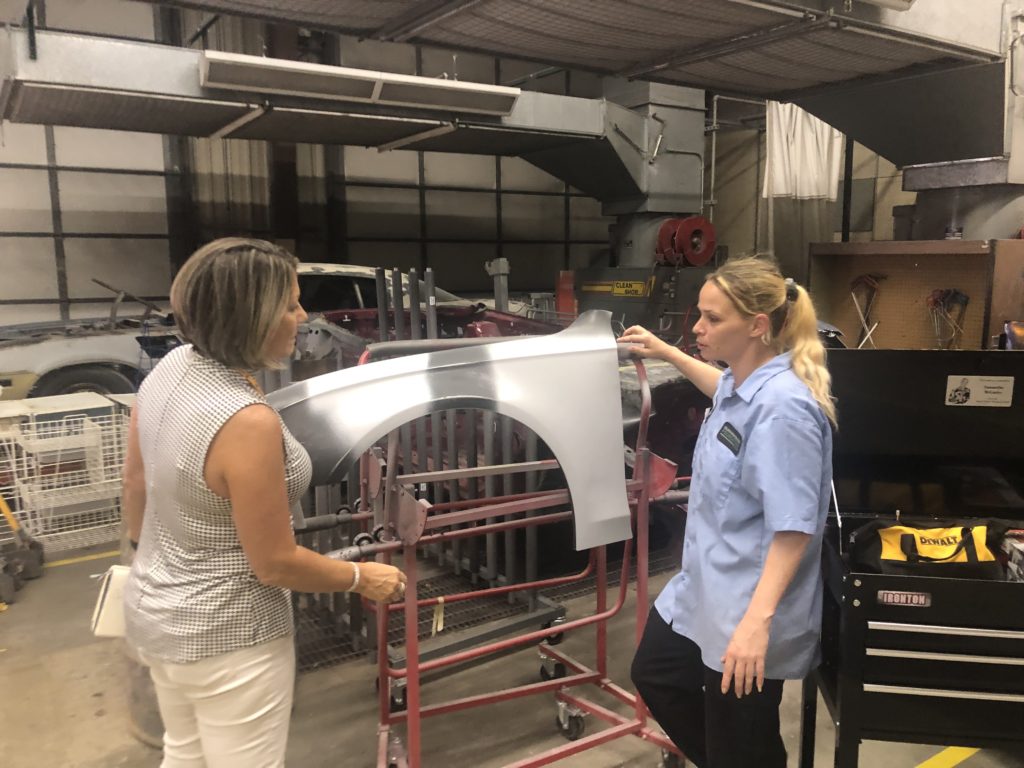
Mont., Ind. auto body repair trade groups announce help for local vo-tech schools
By onAnnouncements | Associations | Business Practices | Education
Two state collision repair trade groups and two national organizations recently announced their support of local vocational educational programs, and their efforts provide a roadmap for repairers to assist schools and foster the skilled labor needed by the industry.
On Aug. 30, the Indiana Auto Body Association described its work on behalf of the Hammond, Ind.-based Area Career Center and said I-CAR has eyed the facility as a regional training site. Four days later, the Collision Repair Education Foundation announced it and Montana Collision Repair Association would raise funds to support Montana’s “lone collision repair training program,” found at Montana State University-Billings.
Montana
CREF said it and the MCRA would raise money to supply MSU-Billings’s City College with a new frame rack, hand tools and aluminum-specific tools and equipment, epoxied floors, student work uniforms and scholarships.
“When I took over the program, most of the tools were in need of repair, replacement, or were obsolete,” MSU-Billings collision instructor Steven Wodrich said in a statement Tuesday. “It has been a struggle to get all the tools I have needed to make my program current. I have worked very hard at finding donations and grants and have been able to update many of our tools but still have a long way to go to be completely current.”
“Tool donations are pretty rare,” CREF development director Brandon Eckenrode said in a 2018 interview following CREF’s facilitation of a retiree’s gift to a Florida school, but they’re “obviously needed” by the nation’s vocational education facilities.
He said at the time sheet metal and plastic parts to practice upon are the No. 1 request by schools. “We kind of target those,” he said last year.
CREF can be a good middleman for shops and individual repairers looking to make such donations. As a nonprofit 501(c)3, it has the ability to send the donor a letter documenting the gift for tax-deduction purposes. Anyone interested in supporting the Montana effort can contact Eckenrode at 312-231-0258 or Brandon.Eckenrode@ed-foundation.org.
“Through our the generous support of sponsors and the local collision industry we hope to help MSU-Billings students receive the education they need to succeed in the collision industry,” Eckenrode said in a statement Tuesday.
“MCRA is proud to team with Collision Repair Education to enhance the future of collision repairers in the state of Montana. Programs such as this are a lifeline to the repairers, schools, trainers, and students supporting the collision repair industry. Thank you for your hard work and dedication,” MCRA President Paul Flores (Rick’s Auto Body) said in a statement.
Indiana
ACC received collision repair industry attention with the March Taylor Memorial Fund’s donation of two toolboxes and sets of tools at the July 25 Indianapolis CIC. Instructor Samantha McCauley delivered a powerful message about vo-tech program hurdles and how the industry could help educators.
In 2018, TechForce concluded based upon federal data that the collision repair industry needs to add 17,200 technicians annually “just to stay level.”
Only 5,791 students graduated postsecondary collision repair programs (such as a community colleges) in 2016, TechForce concluded using NCES stats. TechForce reported 56,596 “automotive,” diesel and collision students combined graduated in 2016 — satisfying less than half the 121,400 combined positions needed by the broader transportation sector based upon BLS data.
McCauley’s program, the only auto body program in Northwest Indiana, is poised for further support from the industry — if it can meet donors halfway.
“The largest need?” IABA wrote in a news release. “To get the bare bones of the facility up to where it needs to such as; the classroom air conditioning, Electrical issues, and relocating the air Compressor to create a teachable area without the loud motor overbearing conversations.”
I-CAR — which is represented in the area by IABA Second Vice President Todd Bonecutter — would like to make the ACC collision center a regional training site, IABA Vice President Andy Tylka said Friday. In return, ACC would receive I-CAR’s curriculum for free — which would allow graduates to emerge with I-CAR certification, said Tylka (Tom and Ed’s Autobody).
I-CAR’s current training site for the Northwest Indiana area is a hotel, and it has a “huge need” for onsite training, Tylka said. As body shops don’t want to send technicians to a competitor’s shop to train, I-CAR is trying to find a central neutral location.
“This is the best candidate for that,” Tylka said.
If the school can make the kind of upgrades described above, I-CAR would use it, Tylka said.
ACC also has been approved for a free Rust-Oleum floor under CREF’s national vo-tech initiative if the school can pay for the application and remove some aged prep stations and large cabinets, Tylka said. The removal would create a more open floorplan and prevent a situation where “undone space” unable to be recoated existed under the cabinets, according to Tylka. He said the walls could also use a coat of paint.
New ACC Director Mary Beth Nickolaou learned about the program and the conditional assistance offers during a tour Aug. 27, according to IABA.
“It was also in discussion that the program is a great candidate for donations and our desire to make the facility an attractable location for students to learn collision repair,” IABA wrote. “We just want to make sure the ‘Bare Bones’ are taken care of first before the Indiana Autobody, CREF, and ICAR provides their time and resources to the facility and program.”
IABA said the principal “learned of the need of training in the area, and what the program could be.” It described her as “very interested in how she could help.” We reached out to Nickolaou on Friday for confirmation and to learn more about her views, and will update if we find out more.
Tylka said he hadn’t even known of the ACC program’s existence until a year and a half ago. He said he sought to donate some equipment, and learned of the school through a paint relationship. He said he recalled observing that ACC had “‘so much potential.'”
He said he got McCauley involved with IABA about six months later, and some local distributors have been contributing to the program. Most, if not all the shops in the area were similarly unaware of the program’s existence, and learning about it really opened their eyes, Tylka said.
McCauley has brought students to IABA meetings, and they’re engaging in job shadowing and can work in a shop for on-site training. Tylka said his own Tom and Ed’s chain has seen a couple of students train on-site, and more than 10 have job-shadowed.
“We have over 15 local Body shops now in support and excited to hire graduates,” IABA wrote Aug. 30. “In addition several more vendors are aware of the program while increasing donations of supplies needed for the curriculum. …
“Indiana Autobody Association will also be involved in heavy student recruitment from the local High Schools to increase attendance at the career center.”
Lessons for other areas
Other regions might well present the kind of circumstances seen in Northwest Indiana and Montana and it behooves repairers and educators to seek each other out, and for vo-tech programs to contact both CREF and I-CAR to learn about possible partnerships or assistance.
For example, I-CAR in 2017 indicated this neutrality desire for local training sites and its space-for-curriculum offer aren’t limited to Northwest Indiana. And CREF helps give out a ton of money to infrastructure-strapped vo-tech sites nationwide annually.
“Collision repair training programs are facing tremendous budgetary pressure. It is difficult for many to maintain their program at current capabilities, no less invest in increasing their abilities to satisfy the industry’s current and future workforce needs,” CREF operations/administration director Melissa Marscin said in a statement in 2018. “The Makeover grant program is designed to help collision schools get the much needed tools, equipment and supplies they couldn’t get otherwise and increase their capabilities. For the third year in a row, every school that applied received some level of support through both grants and in-kind donations.”
And in other industry-supporting-technician news, CREF announced Thursday that Chief had donated an $8,000 PNP90 rivet gun for whoever wins first-place in the Top Tech Mentor/Mentee Competition on Sept. 28 at Saint Louis-Mo.-based Ranken Technical College. Second and third place win 220-volt transformer-based MultiMig 190 welders.
CREF will also award cash prizes for the Top 3 teams. Sign up a mentor-mentee team here.
More information:
Collision Repair Education Foundation, Sept. 3, 2019
CREF, Sept. 5, 2019
Images:
New Area Career Center director Mary Beth Nickolaou, right, visited Aug. 27, 2019, the facility for the collision program overseen by instructor Samantha McCauley, left. (Provided by Indiana Autobody Association)
Montana State University-Billings City College collision instructor Steven Wodrich is shown. (Provided by MSU-Billings)
Hammond, Ind.-based Area Career Center instructor Samantha McCauley, right, and new director Mary Beth Nickolaou, pose Aug. 27, 2019, next to one of the toolboxes donated by the March Taylor Memorial Fund in July 2019. (Provided by Indiana Autobody Association)
New Area Career Center director Mary Beth Nickolaou, left, visited Aug. 27, 2019, the facility for the collision program overseen by instructor Samantha McCauley, right. (Provided by Indiana Autobody Association)



